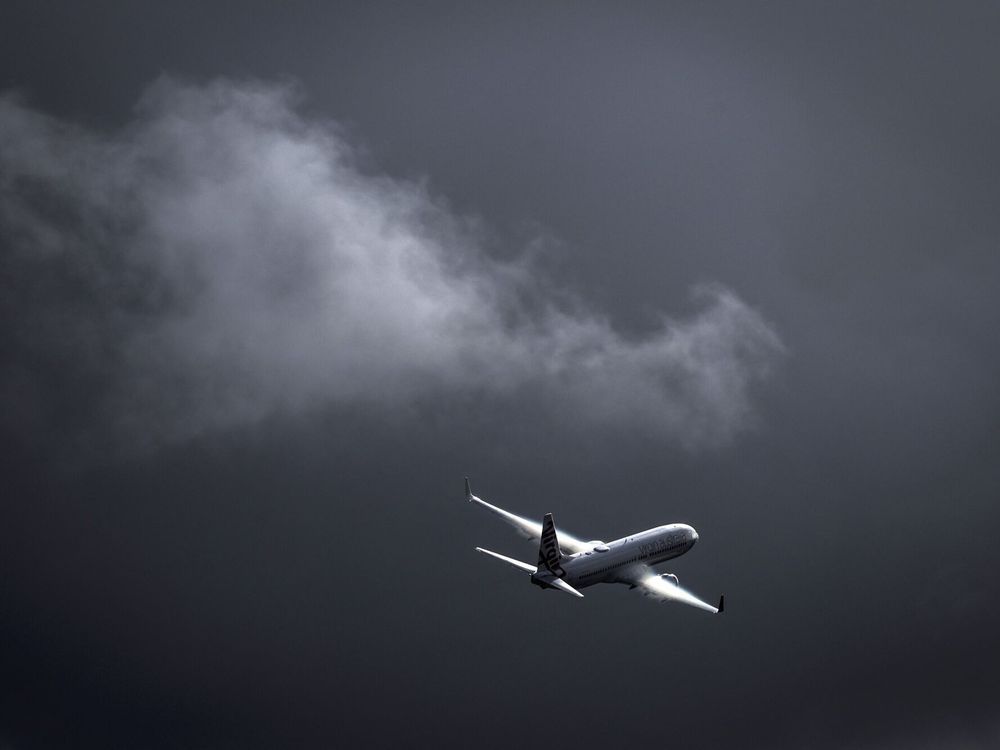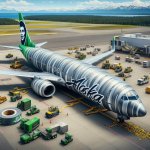Boeing lost hundreds of bad 737 parts: Whistleblower
Author of the article:Bloomberg News
Bloomberg News
Allyson Versprille and Julie Johnsson
Published Jun 18, 2024 • 4 minute read
A Boeing Co. quality inspector alleged that the planemaker mishandled and lost track of hundreds of faulty parts, some of which he said may have been installed on new 737 Max planes, the latest revelation by a whistleblower pointing out possible misconduct at the manufacturer.
The claims were detailed in a June 11 complaint by Boeing inspector Sam Mohawk with the Occupational Safety and Health Administration and were made public by a US Senate subcommittee on Tuesday in a memo to members. Boeing said it’s reviewing the claims after receiving the document late on Monday.
As of last year, Boeing had lost as many as 400 faulty 737 Max aircraft parts and deleted records for many of those from an internal cataloging system, according to the complaint. So-called non-conforming parts are damaged or inadequate components that are supposed to be tracked, disposed of or repaired, with meticulous records to ensure they aren’t used in the aircraft manufacturing process.
Mohawk also claimed that Boeing “intentionally hid” some improperly stored large components such as rudders and flaps from the US Federal Aviation Administration ahead of an on-site inspection.
The allegations, which hadn’t previously been made public, add to a series of other whistleblower claims alleging the company has cut corners in its production and quality processes. Some whistleblowers have said they were encouraged to keep silent or were retaliated against for raising concerns.
“We continuously encourage employees to report all concerns as our priority is to ensure the safety of our airplanes and the flying public,” Boeing said in a statement.
Mohawk’s complaint was released by the Senate’s Permanent Subcommittee on Investigations on the same day that it plans to hear testimony from Boeing Chief Executive Officer Dave Calhoun, providing fresh lines of inquiry to pursue the embattled leader. The panel opened a probe into the planemaker following a near-catastrophe in January, when a fuselage section blew off a 737 Max shortly after takeoff.
Boeing shares fell 1.8% as of 10:21 a.m. on Tuesday in New York. The stock has lost about a third of its value this year.
Documents and whistleblower accounts collected by the panel thus far “paint a troubling picture of a company that prioritizes speed of manufacturing and cutting costs over ensuring the quality and safety of aircraft,” staff from the panel said in a memo to members.
The FAA said in a statement late Monday that it’s encouraged Boeing employees to come forward with their safety concerns and has seen an uptick in reports since Jan. 5 as a result. The agency disclosed last week that it received more than 11 times as many Boeing whistleblower reports in the first five months of this year compared to all of 2023.
“The FAA strongly encourages anyone with safety concerns to report them,” the agency said. “We thoroughly investigate every report, including allegations uncovered in the Senate’s work.”
The fresh claims deepen the pressure that Boeing faces from Washington. The company is under investigation by multiple federal agencies including the Justice Department. Prosecutors are also weighing whether to charge Boeing after it found the planemaker violated a deal that allowed the company to avoid charges following two fatal 737 Max crashes in 2018 and 2019.
Mohawk claimed that dozens of 737 components were being improperly stored outdoors and that Boeing ordered employees to move the majority of them to another location after receiving a notice from the FAA in June 2023 that the agency would be conducting an on-site inspection. He claims the parts were eventually moved back to the outside location or lost completely.
According to the subcommittee’s memo, non-conforming parts at Boeing are supposed to be marked with a red tag or red paint and held in a secure area of the factory.
The demands on Mohawk’s job monitoring those parts surged after the 737 Max’s worldwide grounding triggered by the two deadly crashes. Mohawk alleged that “the overwhelming number of nonconforming parts eventually led his superiors to direct him and others to eliminate or ‘cancel’ the records that designate a part as nonconforming,” according to the memo.
“Boeing needs to stop thinking about the next earnings call and start thinking about the next generation,” Senator Richard Blumenthal, the Connecticut Democrat who chairs the panel, plans to say at the hearing, according to excerpts of his prepared remarks.
Mohawk claims that he tried to elevate the concerns through Boeing’s internal reporting program called “Speak Up,” but that the report was eventually routed to the same managers he had complained about.
The concerns raised by Mohawk bear similarities to allegations previously raised by the late Boeing whistleblower John Barnett about the production of one of the company’s other flagship aircraft, the 787 Dreamliner. Police concluded in May that Barnett’s death, which occurred amid ongoing litigation with the planemaker, was the result of suicide.
At a previous hearing under Blumenthal in April, Boeing engineer Sam Salehpour also alleged that the company had incorrectly assembled the barrel sections of its 787 model to save time and money, an accusation the company has refuted.

 torontosun.com
torontosun.com
Author of the article:Bloomberg News
Bloomberg News
Allyson Versprille and Julie Johnsson
Published Jun 18, 2024 • 4 minute read
A Boeing Co. quality inspector alleged that the planemaker mishandled and lost track of hundreds of faulty parts, some of which he said may have been installed on new 737 Max planes, the latest revelation by a whistleblower pointing out possible misconduct at the manufacturer.
The claims were detailed in a June 11 complaint by Boeing inspector Sam Mohawk with the Occupational Safety and Health Administration and were made public by a US Senate subcommittee on Tuesday in a memo to members. Boeing said it’s reviewing the claims after receiving the document late on Monday.
As of last year, Boeing had lost as many as 400 faulty 737 Max aircraft parts and deleted records for many of those from an internal cataloging system, according to the complaint. So-called non-conforming parts are damaged or inadequate components that are supposed to be tracked, disposed of or repaired, with meticulous records to ensure they aren’t used in the aircraft manufacturing process.
Mohawk also claimed that Boeing “intentionally hid” some improperly stored large components such as rudders and flaps from the US Federal Aviation Administration ahead of an on-site inspection.
The allegations, which hadn’t previously been made public, add to a series of other whistleblower claims alleging the company has cut corners in its production and quality processes. Some whistleblowers have said they were encouraged to keep silent or were retaliated against for raising concerns.
“We continuously encourage employees to report all concerns as our priority is to ensure the safety of our airplanes and the flying public,” Boeing said in a statement.
Mohawk’s complaint was released by the Senate’s Permanent Subcommittee on Investigations on the same day that it plans to hear testimony from Boeing Chief Executive Officer Dave Calhoun, providing fresh lines of inquiry to pursue the embattled leader. The panel opened a probe into the planemaker following a near-catastrophe in January, when a fuselage section blew off a 737 Max shortly after takeoff.
Boeing shares fell 1.8% as of 10:21 a.m. on Tuesday in New York. The stock has lost about a third of its value this year.
Documents and whistleblower accounts collected by the panel thus far “paint a troubling picture of a company that prioritizes speed of manufacturing and cutting costs over ensuring the quality and safety of aircraft,” staff from the panel said in a memo to members.
The FAA said in a statement late Monday that it’s encouraged Boeing employees to come forward with their safety concerns and has seen an uptick in reports since Jan. 5 as a result. The agency disclosed last week that it received more than 11 times as many Boeing whistleblower reports in the first five months of this year compared to all of 2023.
“The FAA strongly encourages anyone with safety concerns to report them,” the agency said. “We thoroughly investigate every report, including allegations uncovered in the Senate’s work.”
The fresh claims deepen the pressure that Boeing faces from Washington. The company is under investigation by multiple federal agencies including the Justice Department. Prosecutors are also weighing whether to charge Boeing after it found the planemaker violated a deal that allowed the company to avoid charges following two fatal 737 Max crashes in 2018 and 2019.
Mohawk claimed that dozens of 737 components were being improperly stored outdoors and that Boeing ordered employees to move the majority of them to another location after receiving a notice from the FAA in June 2023 that the agency would be conducting an on-site inspection. He claims the parts were eventually moved back to the outside location or lost completely.
According to the subcommittee’s memo, non-conforming parts at Boeing are supposed to be marked with a red tag or red paint and held in a secure area of the factory.
The demands on Mohawk’s job monitoring those parts surged after the 737 Max’s worldwide grounding triggered by the two deadly crashes. Mohawk alleged that “the overwhelming number of nonconforming parts eventually led his superiors to direct him and others to eliminate or ‘cancel’ the records that designate a part as nonconforming,” according to the memo.
“Boeing needs to stop thinking about the next earnings call and start thinking about the next generation,” Senator Richard Blumenthal, the Connecticut Democrat who chairs the panel, plans to say at the hearing, according to excerpts of his prepared remarks.
Mohawk claims that he tried to elevate the concerns through Boeing’s internal reporting program called “Speak Up,” but that the report was eventually routed to the same managers he had complained about.
The concerns raised by Mohawk bear similarities to allegations previously raised by the late Boeing whistleblower John Barnett about the production of one of the company’s other flagship aircraft, the 787 Dreamliner. Police concluded in May that Barnett’s death, which occurred amid ongoing litigation with the planemaker, was the result of suicide.
At a previous hearing under Blumenthal in April, Boeing engineer Sam Salehpour also alleged that the company had incorrectly assembled the barrel sections of its 787 model to save time and money, an accusation the company has refuted.

Boeing lost hundreds of bad 737 parts: Whistleblower
A Boeing Co. quality inspector alleged that the planemaker mishandled and lost track of hundreds of faulty parts.








